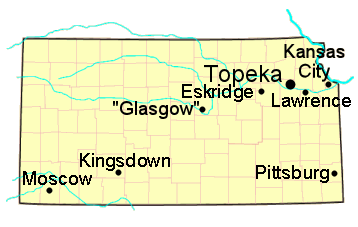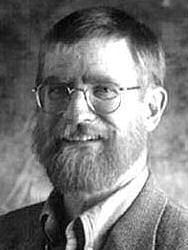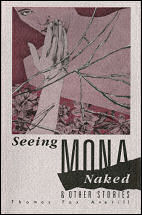
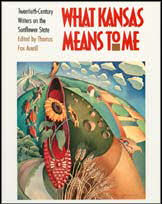
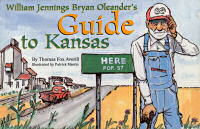
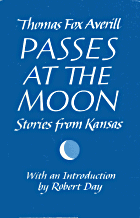
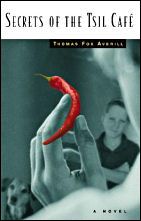
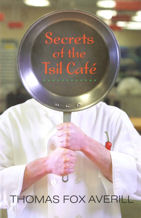
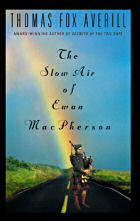
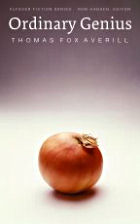
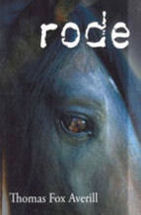
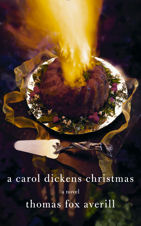
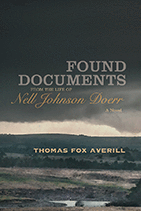
|
| Biography |
|
| |
Thomas Fox Averill is Writer-in-residence and Professor of English
at Washburn University of Topeka, where he teaches courses in Creative Writing and in Kansas Literature, Folklore and Film.
His story collections are Passes at the Moon (Woodley Press, 1985), Seeing Mona Naked (Watermark Press, 1989), and Ordinary Genius (University of Nebraska Press, 2005). He is the editor of What Kansas Means to Me: Twentieth Century Writers on the Sunflower State (University Press of Kansas 1990). In the Fall of 1996, Eagle Books (Wichita) brought out his Oleadegr's Guide to Kansas: How You Know When You're Here. His novels are Secrets of the Tsil Cafe (BlueHen/Putnam, 2001), The Slow Air of Ewan MacPherson (BlueHen/Berkley, 2003), and rode (University of New Mexico Press, 2011). New Mexico reprinted Tsil Cafe in 2012.
He helped to found, and was the first director of, Washburn's Center for Kansas Studies. He is the author of numerous articles, poems, and short stories (most recently in New Letters, Cimarron Review, Chariton Review, North American Review and Doubletake), and is a frequent speaker on Kansas Culture.
He has edited several books for Woodley Press and the Center for Kansas Studies (most recently The Loose Change of Wonder, poems by Steven Hind, and A West Wind Rises: Massacre at Marais des Cygnes, by Bruce Cutler.
He is also a monthly commentator in the voice of William Jennings Bryan Oleander of Here, Kansas, for KANU, National Public Radio from the University of Kansas. His Oleander play, "Abide With Me," won the first Great Plains Play Competition, and was produced by the University of Kansas Theatre as the final play of the 1996-97 Season.
Return to Top of Page |
|
|
Bibliography (  - housed in Thomas Fox Averill Kansas Studies Collection) - housed in Thomas Fox Averill Kansas Studies Collection) |
|
| |
Publications:
Short Stories:
Story Collections:
Return to Top of Page |
|
|
Honors
|
|
| |
- J. Donald Coffin Award for the best book published by a Kansas Authors Club Member in 1985, won for Passes at the Moon
- Third Seaton Award Story for "Resurrection Run," Kansas Quarterly, Vol 3, 1988
- Honorable Mention for "Running Blind" in 1989 World's Best Short Short Story Contest, Florida State University
- First Prize for "The Man Who Ran With Deer," in 1989 H.G. Roberts Writing Awards Annual Competition, judged by George Garett
- First Prize in fiction for "Topeka Underground," in the 1990 Winfield, Kansas, Arts and Humanities Committee's Kansas Voices competition
- O. Henry Award Story for "During the Twelfth Summer of Elmer D. Peterson," published in Farmer's Market
- Byron Caldwell Smith Award, Hall Center for the Humanities, for best book published by a Kansas writer in 1989/1990, given to Seeing Mona Naked
- 1993 Governor's Artist Award in the Literary Arts, selected by the Kansas Arts Commission
- Edgar Wolfe Literary Award, Kansas City/Wyandotte County Library, 2002
- Finalist, Literary Food Writing, Cookbook Awards, International Association of Culinary Professionals, 2002
- Kansas Arts Commission, Fiction Fellowship, 2006
- Kansas Center for the Book, Ordinary Genius named Notable Book of 2005
- Outstanding Western of Novel of 2011, given by the National Cowboy and Western Heritage Museum of Oklahoma City, for rode
- Spur Award Finalist, from the Western Writers of America, for rode
- Kansas Center for the Book, rode named Notable Book of 2011
- Finalist, Historical Novel, Arizona/New Mexico Book Awards of 2011, for rode
Return to Top of Page |
|
|
Writing Samples |
|
| |
The beginning of Averill's O. Henry Award story, also in Ordinary Genius:
During the Twelfth Summer of Elmer D. Peterson
Elmer hated his name. He always had. But now he hated it even
more. He hated the farm his parents had moved him to. He hated the
country. He hated not being able to ride his bike. He hated not having
any friends.
Actually, since June first, he'd hated even being Elmer D.
Peterson. June first was the day his father quit his electrician's job
for good. That was the day they'd moved out into the middle of nowhere,
Wabaunsee County, Kansas, for good. That was the day he'd done his last
run with the Sunflower Track Club and quit the team for good. That was
the day everything went bad. For good!
Now, there was nothing to do but help his parents. Out here, they
didn't have cable TV. They didn't have people his age to run track with.
They didn't even have a track near enough to run on regularly. They
didn't have a good paved road near enough to ride his touring bicycle on.
They didn't have anything but sky and grass and work.
“Rise and shine!” his father yelled up the attic stairs every
morning.
“No way!” he shouted back. ...
Secrets of the Tsil Cafe:
My crib, and then my bed, were in my mother's kitchen, where she
spent most of her time. Sunshine streamed into her southern windows and onto her plants, pots, pans, bottles and jars. And on her cookbooks,
shelves of them. The bottom shelf, though, was mine. By the time I was
three, I had learned that my mother would stop almost anything if I asked
her to read me a book. I would run to that bottom shelf and pull out
Winnie the Pooh, and we would read the adventures of Robin, Pooh, Piglet and the rest. My mother was a tall woman and I loved jumping into her lap, being engulfed by her arms, looking at the pictures, and the words. Her long braid was often curled around her shoulder, and I sometimes held it, pretending it was Eeyore's tail.
One day, when we were reading Pooh, my mother pointed to the word
honey. “This is a word, Art,” she said. “It says honey. She stood up,
leaving me to sit on the kitchen chair. “But it isn't honey.” It's only a
word. You know what honey really is, don’t you?” She took down her honey jar and brought two spoons. “Let's taste this word,” she said. She
dipped a spoon in the honey and brought it out, twirling it in the
sunlight. The honey glowed. She put it in my mouth, where it was warm
and golden and sweet, where it coated my tongue and melted into my throat.
“Mothers make milk for their babies,” said my mother. “I made
milk for you.” She twirled another spoonful of honey in the air and put
it in her mouth. “And bees make honey for their babies, Art. Those are
the only two natural foods, made only to be eaten. They’re not anything
else--not seeds, not flowers, not fruits, not leaves, not roots. They’re
food, and food alone.”
“I want some milk,” I said. And we drank.
“Milk and honey,” she said. “When you’re a baby, you live in the land of milk and honey.”
“Can we taste other words?” I asked.
From then on, when we read, we tasted words. With Mother Goose we
had a “little nutmeg" and a “golden pear.” We ate Peter Piper’s "pickled
peppers” from my mother's jars of pepperoncinis and cherry peppers.
Once, we were "pumpkin eaters" like Peter, Peter. Like Jack Horner, we
put "plums on our thumbs” and said I was a “good boy.” We even ate lamb, though my mother insisted it was not Mary’s “little lamb.” We stopped short of “four and twenty blackbirds.” ...
Return to Top of Page |
|
|
| Other |
| |
Faculty web page of Thomas Fox Averill
Interview with Miranda Ericsson, Topeka & Shawnee County Public Library.
Return to Top of Page |
|
|
|

